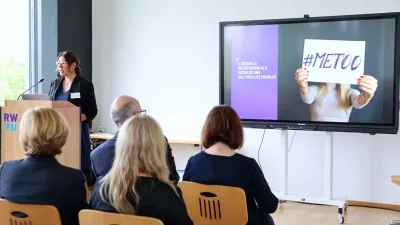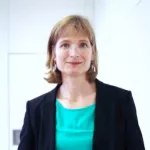At a glance
Dates
All events
Ensuring social justice through participation
Questions of participation, inclusion and social justice have always been among the core issues of social work. In the light of current social developments, these issues are now even more central than before. Those working in social work need a wide range of knowledge and tools with regard to participation orientation and inclusion mediation. This is precisely the focus of our master's program in Social Work and Participation.

Connection between theory and practice
In the practice of social work, challenging situations arise with different target groups, for which a professional concept of participation and inclusion is needed. This includes political, ethical, organizational and professional theoretical foundations. Questions that arise from this are: What can social work contribute to analyze exclusion processes? How must social work instruments and procedures for inclusion look like, be adapted or modified against this background? In the master's program Social Work and Participation, these questions are discussed through a social work science approach.

Profession & Perspectives
The job market for graduates of the Social Work and Participation program is remarkably receptive and promising. In the future, experts will be increasingly needed in almost all fields of social work who have a clear view of the exclusionary mechanisms of society and who know and can apply possibilities of concrete inclusion and participation promotion. In later practice, our graduates will be able to independently prepare, implement and evaluate innovative projects for the promotion of participation and inclusion. In addition, the master's program qualifies graduates for doctoral studies.
Downloads
- Alle Infos kompakt auf einen Blick.
- §39 der Studien- und Prüfungsordnung für die Masterstudiengänge - Fassung vom 29. Juni 2023
- Ältere Modulhandbücher sind im QM Portal abgelegt.
- Studien- und Prüfungsordnung für die Masterstudiengänge mit Allgemeinem Teil - Diese Änderungssatzung tritt zum WiSe 2023/24 in Kraft
- Satzung der Hochschule Ravensburg-Weingarten über die Regelungen zum Hochschulzulassungs- und –auswahlverfahren für Masterstudiengänge vom 3. April 2025
Further information
Curriculum

As a student in the master's program in Social Work and Participation, you will learn how to intertwine theory and practice. You will expand specific and proven professional competencies in the field of participation promotion and inclusion. You will learn to analyze societal change and assess the consequences for your social professional actions. In addition, you will expand and deepen research methodological competencies so that you can interpret research findings appropriately and make them useful for your work.
The program is divided into five areas of competence that are closely interlinked throughout the course of study: In the area of fundamentals, social work theoretical, sociological and legal foundations of social work are taught and applied to the fields of action of the labor market, education, disability and migration. For these fields of action, practice methods are also taught that are oriented to the intervention levels of the individual case, the organization, the social space and the political level. Scientific methods also define the research-oriented profile of the program and lay the foundation for the implementation of projects.
Admission
Application deadline for the summer semester 2023
15.01.2023
The master's program is designed as a three-semester full-time program. The attendance phases are usually concentrated on Monday to Wednesday. If necessary, they are supplemented by block courses (Thurs-Sat) during the semester. The remaining study time consists of self-directed learning, group and project work, research, reading, exam preparation, etc. With appropriate scheduling, it is also possible to complete the program in five or six semesters. In principle, this allows for more extensive part-time work (15-20 hours per week), or is suitable for students who have family obligations in addition to their studies.
Admission requirements are a successfully completed degree in social work or other university degrees with a curricular affinity to social work, with an overall grade of at least 2.5 and a credit total of at least 210 ECTS credits. All applicants who meet the admission requirements for this master's program are admitted.
Applicants whose Bachelor's degree comprises 180 ECTS must complete the missing ECTS at the latest by the time they register for the Master's thesis. The missing 30 ECTS can be provided as follows:
A. Through the recognition of competences acquired outside the university. Such competences are in particular the attendance of courses and further education on social work at other universities or further education institutions, as well as internships in relevant fields of social work. Internships can be credited up to a total of 15 ECTS (corresponds to nine weeks of full-time internship plus written internship report). The relevant regulations of the Praxisamt of the faculty apply, which will be happy to advise you on this.
B. Through the recognition of competencies acquired within the university. Modules taken in the Bachelor's program in Social Work at the HRW are considered as such. Students are advised in this regard by the Dean of Studies.
2. if the bachelor's degree certificate is not yet available at the time of the application deadline for the master's program due to the absence of individual examination results, admission is granted on the condition that the bachelor's degree and the admission requirements associated with it are proven by May 15.
The program always starts in the summer semester. The application deadline is January 15.
Here you can access the
Online application
Semester fee
Every semester , a semester fee is due for all students upon enrollment or re-registration. This fee is charged at a similar rate by all universities in Germany.
Composition and amount of the fee
Fees for international students and for second degree studies
In Baden-Württemberg, there has been a tuition fee for international students (non-EU citizens) and a second-study fee since the winter semester 2017/2018. Thus, in some cases, a tuition fee must be paid in addition to the semester fee.
Prior to enrollment, applicants from non-EU countries or applicants for a second degree will receive a form to assess whether a tuition fee obligation actually exists.
The amounts and detailed information can be found under Finances.
News
News of this degree program

Press release
See. Look. Act.
Three universities from the border triangle meet for the Euregio Ring Conference at RWU. This year's topic: "Acting together against sexual harassment at universities".
Projektberichte und Masterarbeiten
Projektberichte
- Projektarbeit zur Partizipativen Stadtplanung
- Projektarbeit zu Gewaltschutz in der Behindertenhilfe
Masterarbeiten
- Gemeinsam Allein, Einsamkeit der Lebenspartnerinnen von Menschen mit Demenz in der häuslichen Pflege
- Hochsensibilität im Berufsfeld Kindertagesstätte
Image galleries
Photo galleries of this degree program
Contact & People
General contact details
| Opening hours | by appointment by e-mail |
|---|---|
| Phone | |
| stm@rwu.de | |
| Room | A 116 |
| On campus |
Building A
Leibnizstr. 10
88250 Weingarten |
| Postal address |
RWU Hochschule Ravensburg-Weingarten University of Applied Sciences Social Work and Participation P.O. Box 30 22
88216 Weingarten Germany |
Program Management & Student Advisory Service
Study Program Coordination

- Building A
- Room A 019, A 116
Professors


Employees & Staff

Dean's Office
Contact person for sexual harassment, safety officer, senator and member of the QM working group



Admission Office
Examination Office


